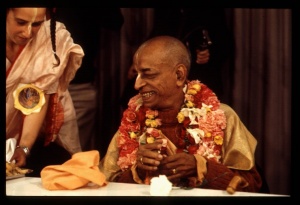CC Madhya 16.114-115: Difference between revisions
m (1 revision(s)) |
(Vanibot #0054 edit - transform synonyms into clickable links, which search similar occurrences) |
||
| (One intermediate revision by one other user not shown) | |||
| Line 1: | Line 1: | ||
{{ | [[Category:Sri Caitanya-caritamrta - Madhya-lila Chapter 16|C114]] | ||
<div style="float:left">'''[[Sri Caitanya-caritamrta|Śrī Caitanya-caritāmṛta]] - [[CC Madhya|Madhya-līlā]] - [[CC Madhya 16|Chapter 16: The Lord's Attempt to Go to Vṛndāvana]]'''</div> | |||
<div style="float:right">[[File:Go-previous.png|link=CC Madhya 16.113|Madhya-līlā 16.113]] '''[[CC Madhya 16.113|Madhya-līlā 16.113]] - [[CC Madhya 16.116|Madhya-līlā 16.116]]''' [[File:Go-next.png|link=CC Madhya 16.116|Madhya-līlā 16.116]]</div> | |||
{{CompareVersions|CC|Madhya 16.114-115|CC 1975|CC 1996}} | |||
{{RandomImage}} | |||
==== TEXTS 114-115 ==== | ==== TEXTS 114-115 ==== | ||
<div | <div class="verse"> | ||
eka navya-naukā | :eka navya-naukā āni' rākhaha nadī-tīre | ||
yāhāṅ snāna | :yāhāṅ snāna kari' prabhu yā'na nadī-pāre | ||
tāhāṅ stambha ropaṇa kara | :tāhāṅ stambha ropaṇa kara 'mahā-tīrtha' kari' | ||
nitya snāna kariba tāhāṅ, tāhāṅ yena mari | :nitya snāna kariba tāhāṅ, tāhāṅ yena mari | ||
</div> | </div> | ||
| Line 14: | Line 18: | ||
==== SYNONYMS ==== | ==== SYNONYMS ==== | ||
<div | <div class="synonyms"> | ||
''[//vanipedia.org/wiki/Special:VaniSearch?s=eka&tab=syno_o&ds=1 eka]'' — one; ''[//vanipedia.org/wiki/Special:VaniSearch?s=navya&tab=syno_o&ds=1 navya]'' — new; ''[//vanipedia.org/wiki/Special:VaniSearch?s=naukā&tab=syno_o&ds=1 naukā]'' — boat; ''[//vanipedia.org/wiki/Special:VaniSearch?s=āni&tab=syno_o&ds=1 āni] '' — bringing; ''[//vanipedia.org/wiki/Special:VaniSearch?s=rākhaha&tab=syno_o&ds=1 rākhaha]'' — keep; ''[//vanipedia.org/wiki/Special:VaniSearch?s=nadī&tab=syno_o&ds=1 nadī]-[//vanipedia.org/wiki/Special:VaniSearch?s=tīre&tab=syno_o&ds=1 tīre]'' — on the bank of the river; ''[//vanipedia.org/wiki/Special:VaniSearch?s=yāhāṅ&tab=syno_o&ds=1 yāhāṅ]'' — where; ''[//vanipedia.org/wiki/Special:VaniSearch?s=snāna&tab=syno_o&ds=1 snāna] [//vanipedia.org/wiki/Special:VaniSearch?s=kari&tab=syno_o&ds=1 kari] '' — taking a bath; ''[//vanipedia.org/wiki/Special:VaniSearch?s=prabhu&tab=syno_o&ds=1 prabhu]'' — Śrī Caitanya Mahāprabhu; ''[//vanipedia.org/wiki/Special:VaniSearch?s=yāna&tab=syno_o&ds=1 yāna]'' — goes; ''[//vanipedia.org/wiki/Special:VaniSearch?s=nadī&tab=syno_o&ds=1 nadī]-[//vanipedia.org/wiki/Special:VaniSearch?s=pāre&tab=syno_o&ds=1 pāre]'' — on the other bank of the river; ''[//vanipedia.org/wiki/Special:VaniSearch?s=tāhāṅ&tab=syno_o&ds=1 tāhāṅ]'' — there; ''[//vanipedia.org/wiki/Special:VaniSearch?s=stambha&tab=syno_o&ds=1 stambha]'' — a memorial column; ''[//vanipedia.org/wiki/Special:VaniSearch?s=ropaṇa&tab=syno_o&ds=1 ropaṇa] [//vanipedia.org/wiki/Special:VaniSearch?s=kara&tab=syno_o&ds=1 kara]'' — establish; ''[//vanipedia.org/wiki/Special:VaniSearch?s=mahā&tab=syno_o&ds=1 mahā]-[//vanipedia.org/wiki/Special:VaniSearch?s=tīrtha&tab=syno_o&ds=1 tīrtha] [//vanipedia.org/wiki/Special:VaniSearch?s=kari&tab=syno_o&ds=1 kari] '' — making that place a great place of pilgrimage; ''[//vanipedia.org/wiki/Special:VaniSearch?s=nitya&tab=syno_o&ds=1 nitya]'' — daily; ''[//vanipedia.org/wiki/Special:VaniSearch?s=snāna&tab=syno_o&ds=1 snāna] [//vanipedia.org/wiki/Special:VaniSearch?s=kariba&tab=syno_o&ds=1 kariba]'' — I shall bathe; ''[//vanipedia.org/wiki/Special:VaniSearch?s=tāhāṅ&tab=syno_o&ds=1 tāhāṅ]'' — there; ''[//vanipedia.org/wiki/Special:VaniSearch?s=tāhāṅ&tab=syno_o&ds=1 tāhāṅ]'' — there; ''[//vanipedia.org/wiki/Special:VaniSearch?s=yena&tab=syno_o&ds=1 yena] [//vanipedia.org/wiki/Special:VaniSearch?s=mari&tab=syno_o&ds=1 mari]'' — let me die. | |||
</div> | </div> | ||
| Line 21: | Line 25: | ||
==== TRANSLATION ==== | ==== TRANSLATION ==== | ||
<div | <div class="translation"> | ||
The King also ordered them to maintain a new boat on the banks of the river, and wherever Śrī Caitanya Mahāprabhu took His bath or crossed to the other side of the river, they should establish a memorial column and make that place a great place of pilgrimage. | The King also ordered them to maintain a new boat on the banks of the river, and wherever Śrī Caitanya Mahāprabhu took His bath or crossed to the other side of the river, they should establish a memorial column and make that place a great place of pilgrimage. "Indeed," said the King, "I will take my bath there. And let me also die there." | ||
</div> | </div> | ||
__NOTOC__ | |||
<div style="float:right; clear:both;">[[File:Go-previous.png|link=CC Madhya 16.113|Madhya-līlā 16.113]] '''[[CC Madhya 16.113|Madhya-līlā 16.113]] - [[CC Madhya 16.116|Madhya-līlā 16.116]]''' [[File:Go-next.png|link=CC Madhya 16.116|Madhya-līlā 16.116]]</div> | |||
__NOTOC__ | |||
__NOEDITSECTION__ | |||
Latest revision as of 22:01, 19 February 2024

A.C. Bhaktivedanta Swami Prabhupada
TEXTS 114-115
- eka navya-naukā āni' rākhaha nadī-tīre
- yāhāṅ snāna kari' prabhu yā'na nadī-pāre
- tāhāṅ stambha ropaṇa kara 'mahā-tīrtha' kari'
- nitya snāna kariba tāhāṅ, tāhāṅ yena mari
SYNONYMS
eka — one; navya — new; naukā — boat; āni — bringing; rākhaha — keep; nadī-tīre — on the bank of the river; yāhāṅ — where; snāna kari — taking a bath; prabhu — Śrī Caitanya Mahāprabhu; yāna — goes; nadī-pāre — on the other bank of the river; tāhāṅ — there; stambha — a memorial column; ropaṇa kara — establish; mahā-tīrtha kari — making that place a great place of pilgrimage; nitya — daily; snāna kariba — I shall bathe; tāhāṅ — there; tāhāṅ — there; yena mari — let me die.
TRANSLATION
The King also ordered them to maintain a new boat on the banks of the river, and wherever Śrī Caitanya Mahāprabhu took His bath or crossed to the other side of the river, they should establish a memorial column and make that place a great place of pilgrimage. "Indeed," said the King, "I will take my bath there. And let me also die there."